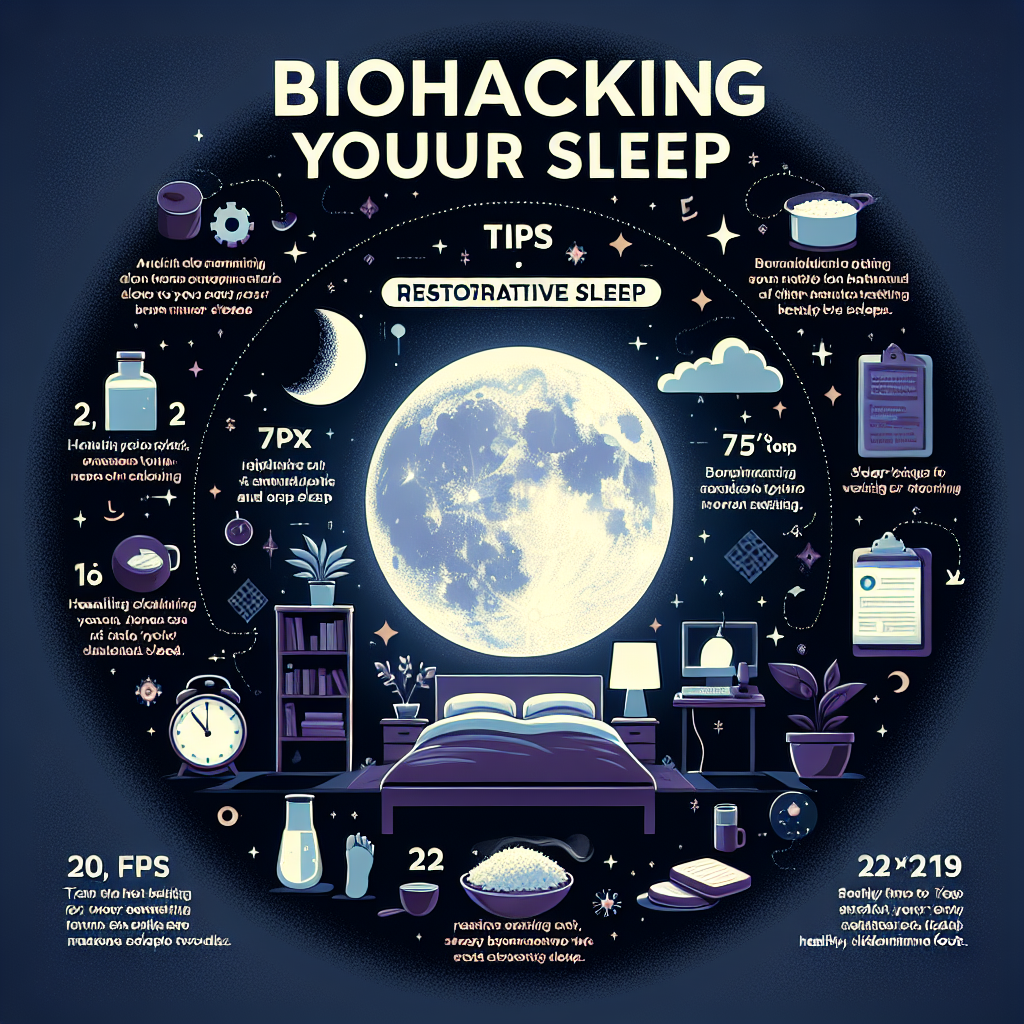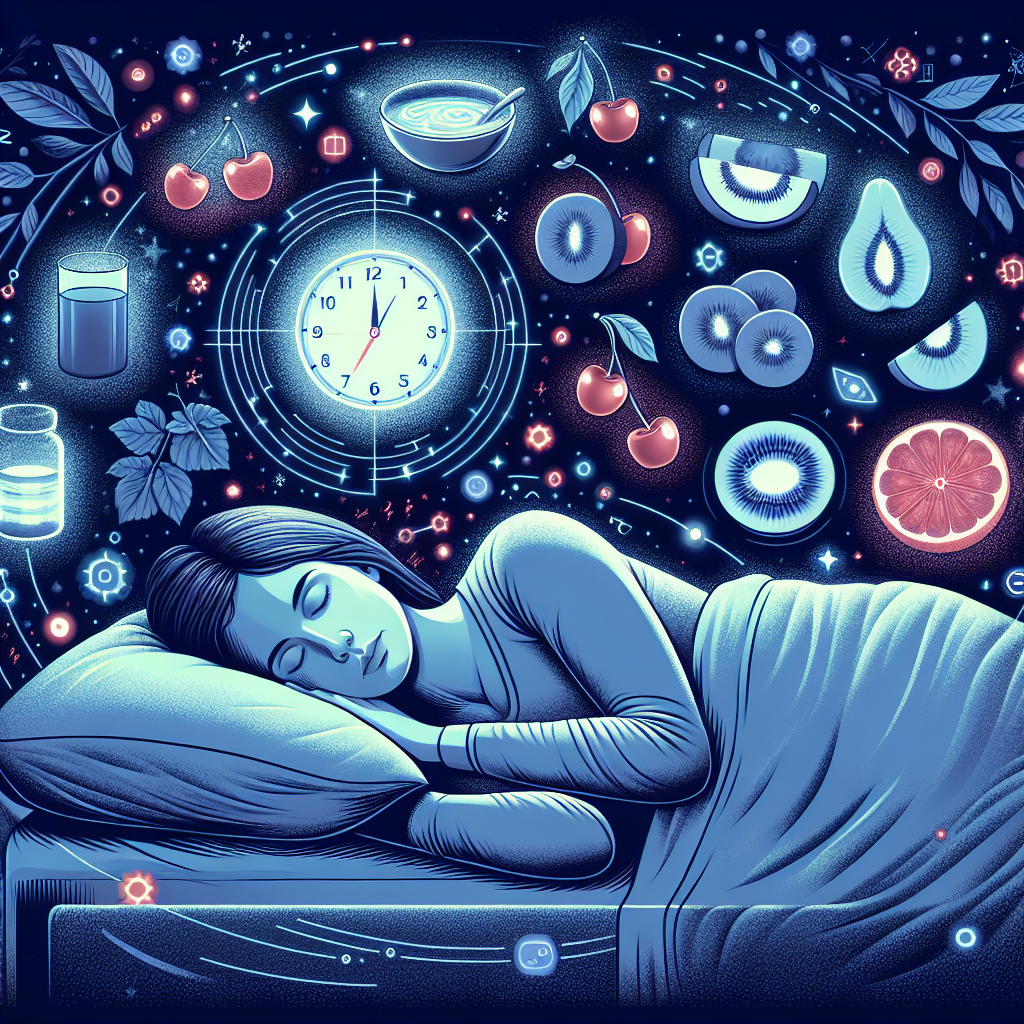Biohacking Your Sleep: Tips for Restorative Sleep

Discover the secrets of biohacking your sleep for a more restorative rest! Learn valuable tips and techniques that can transform your sleep quality and overall health. Don’t wait, start your journey to better sleep today. Click here to get started.
Unlocking Better Sleep: Biohacking Techniques for Restful Nights
Biohacking, a term that has gained significant traction in recent years, refers to the process of making changes to your lifestyle in order to “hack” your body’s biology and feel your best. Everything we put into our bodies — our foods, our thoughts, our physical fitness routines — are inputs to our biological system, and biohacking uses these inputs to optimize our health and well-being. One area where biohacking can have a profound impact is on our sleep. By understanding and manipulating the various factors that can affect our sleep, we can potentially unlock the secret to restorative, restful nights.
Sleep is a critical component of our overall health. It’s a time when our bodies repair and rejuvenate themselves, and our brains process and consolidate the day’s experiences. However, many people struggle with achieving a good night’s sleep. This is where biohacking comes in. By making strategic changes to our behaviors and environments, we can potentially improve the quality of our sleep.
One of the most effective biohacking techniques for sleep involves regulating our exposure to light. Our bodies’ sleep-wake cycles are governed by our circadian rhythms, which are heavily influenced by light. Exposure to natural light during the day can help keep our circadian rhythms in check, promoting alertness during the day and sleepiness at night. Conversely, exposure to artificial light in the evening — particularly the blue light emitted by electronic devices — can interfere with our bodies’ production of melatonin, a hormone that promotes sleep. Therefore, one of the simplest biohacks for better sleep is to get plenty of natural light during the day, and limit exposure to artificial light in the evening.
Another biohacking technique involves manipulating our diets. Certain foods and drinks can interfere with our sleep. Caffeine and alcohol, for example, can disrupt our sleep patterns. On the other hand, certain nutrients can promote better sleep. Magnesium, for example, can help our bodies produce melatonin. Tryptophan, an amino acid found in many protein-rich foods, can also help our bodies produce melatonin. Therefore, another biohack for better sleep might involve adjusting our diets to limit sleep-disrupting substances and increase intake of sleep-promoting nutrients.
Physical activity is another important factor that can affect our sleep. Regular exercise can help regulate our circadian rhythms, promote better sleep quality, and reduce symptoms of insomnia. However, the timing of exercise can also be important. Exercising too close to bedtime can interfere with our ability to fall asleep, as it can leave us feeling energized and alert. Therefore, a biohack for better sleep might involve incorporating regular exercise into our routines, but ensuring that it’s done well before bedtime.
Finally, our sleep environments can also play a big role in how well we sleep. Factors such as temperature, noise, and light can all affect the quality of our sleep. For example, research has shown that cooler temperatures can promote better sleep. Therefore, a biohack for better sleep might involve making adjustments to our sleep environments — such as using blackout curtains to block out light, using white noise machines to drown out disruptive noises, or adjusting the thermostat to a cooler setting.
In conclusion, biohacking our sleep involves understanding the various factors that can affect our sleep, and making strategic changes to our behaviors and environments to optimize these factors. By doing so, we can potentially unlock the secret to restorative, restful nights.
Revolutionizing Rest: How to Biohack Your Sleep for Optimal Recovery

Biohacking, a term that has gained significant traction in recent years, refers to the process of making changes to your lifestyle in order to “hack” your body’s biology and feel your best. Everything we put into our bodies — our foods, our thoughts, our physical fitness routines — are inputs to our biological system. By biohacking these inputs, we can control and optimize our outputs. One of the most critical aspects of our daily lives that can be biohacked is sleep.
Sleep is a fundamental human function that plays a vital role in our overall health and wellbeing. It is during sleep that our bodies repair, rejuvenate, and prepare for the next day. However, in our fast-paced, always-on society, sleep often falls by the wayside. This is where the concept of biohacking comes into play. By making strategic changes to our sleep habits and environment, we can revolutionize our rest and optimize our recovery.
The first step in biohacking your sleep is understanding your personal sleep needs. Everyone’s sleep requirements are different, and what works for one person may not work for another. Some people may need eight hours of sleep, while others may function optimally on six. It’s important to listen to your body and adjust your sleep schedule accordingly.
Next, consider the quality of your sleep. It’s not just about the quantity of sleep you get, but also the quality. Deep, restorative sleep is crucial for optimal health and functioning. To enhance the quality of your sleep, consider incorporating relaxation techniques into your bedtime routine, such as meditation or deep breathing exercises. These practices can help to calm the mind and prepare the body for sleep.
The environment in which you sleep can also significantly impact the quality of your rest. A dark, quiet, and cool room is ideal for promoting deep, restorative sleep. Consider investing in blackout curtains, earplugs, or a white noise machine to create an optimal sleep environment.
Nutrition also plays a crucial role in sleep quality. Consuming a balanced diet rich in fruits, vegetables, lean proteins, and whole grains can help to regulate your sleep cycle. Additionally, certain foods and drinks, such as caffeine and alcohol, can disrupt your sleep and should be avoided close to bedtime.
Exercise is another important factor in sleep quality. Regular physical activity can help to regulate your sleep cycle and promote deeper, more restorative sleep. However, it’s important to time your workouts correctly. Exercising too close to bedtime can stimulate the body and make it difficult to fall asleep.
Lastly, consider incorporating technology into your sleep routine. There are numerous sleep tracking devices and apps available that can provide valuable insights into your sleep patterns. These tools can help you to identify any issues with your sleep and make necessary adjustments.
In conclusion, biohacking your sleep involves a combination of understanding your personal sleep needs, enhancing the quality of your sleep through relaxation techniques and an optimal sleep environment, maintaining a balanced diet, engaging in regular physical activity, and utilizing technology. By making these strategic changes, you can revolutionize your rest and optimize your recovery, leading to improved health and wellbeing.
The Science of Sleep: Biohacking Strategies for Enhanced Rest and Rejuvenation
Biohacking, a term that has gained significant traction in recent years, refers to the process of making changes to your lifestyle in order to “hack” your body’s biology and feel your best. Everything we put into our bodies — our foods, our thoughts, our physical movement — are inputs to our biological system and can be adjusted to optimize our overall well-being. One area of biohacking that is gaining increasing attention is sleep. By understanding the science of sleep and employing biohacking strategies, we can enhance our rest and rejuvenation, leading to improved health and performance.
Sleep is a complex physiological process that is essential for our cognitive functions, emotional well-being, and overall health. It is during sleep that our bodies repair tissues, synthesize hormones, and consolidate memories. However, in our fast-paced, always-on society, sleep is often the first thing to be compromised. This is where the concept of biohacking comes in. By making strategic changes to our sleep habits and environment, we can biohack our sleep for enhanced rest and rejuvenation.
One of the most effective biohacking strategies for sleep involves regulating our exposure to light. Our bodies have an internal clock, or circadian rhythm, that regulates the timing of various physiological processes, including sleep. This clock is largely influenced by light. Exposure to natural light during the day and darkness at night helps to keep our circadian rhythms in check. However, in our modern world, we are often exposed to artificial light at night, which can disrupt our circadian rhythms and impair sleep. To biohack your sleep, try to get plenty of natural light during the day, and limit your exposure to artificial light in the evening. Consider using blackout curtains in your bedroom and turning off electronic devices at least an hour before bed.
Another biohacking strategy for sleep involves optimizing your sleep environment. Your bedroom should be a sanctuary for sleep. It should be cool, quiet, and free from distractions. Consider investing in a high-quality mattress and pillows to ensure proper support and comfort. You might also consider using a white noise machine or earplugs to block out disruptive noises.
Nutrition also plays a crucial role in sleep. Certain foods and drinks can either help or hinder your sleep. Caffeine and alcohol, for example, can disrupt your sleep patterns, while foods rich in magnesium and tryptophan can promote sleep. As part of your sleep biohacking strategy, pay attention to what you eat and drink in the hours leading up to bedtime.
Finally, establishing a regular sleep schedule can greatly enhance your sleep. Going to bed and waking up at the same time each day can help to regulate your body’s internal clock and improve the quality of your sleep. While it might be tempting to sleep in on weekends, try to stick to your regular sleep schedule as much as possible.
In conclusion, by understanding the science of sleep and employing biohacking strategies, we can enhance our rest and rejuvenation. Regulating our exposure to light, optimizing our sleep environment, paying attention to our nutrition, and establishing a regular sleep schedule are all effective ways to biohack our sleep. While these strategies may require some effort and discipline, the benefits to our health and well-being are well worth it.